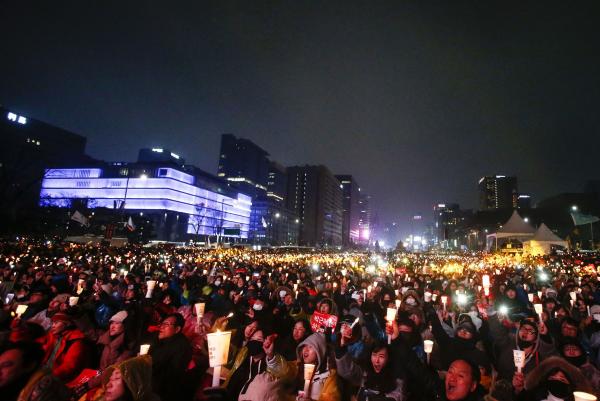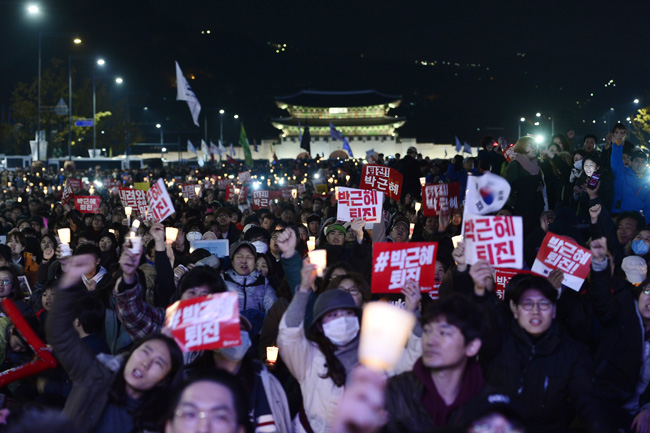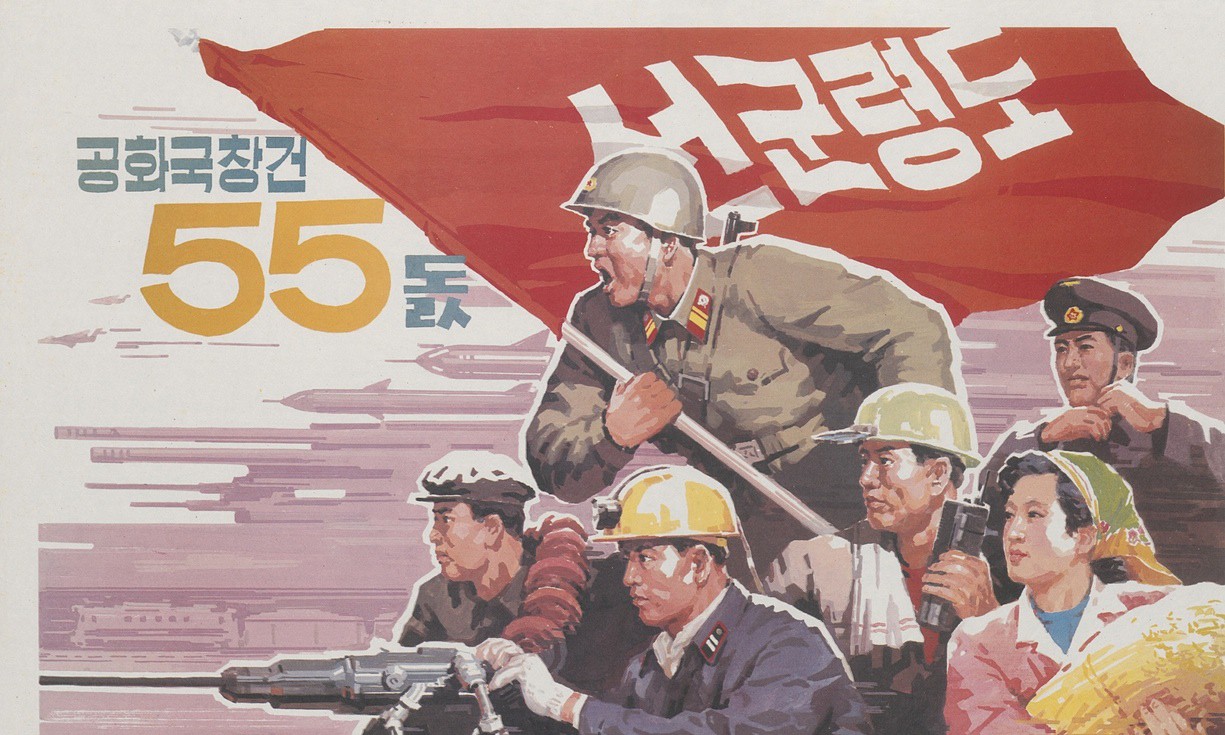President Park Geun-hye stated on Tuesday that she will await the ruling of the Constitutional Court if the impeachment motion passes through the National Assembly. This comes on the heels of Park meeting with Saenuri lawmakers, a meeting in which many feel that resignation was discussed. Park also vowed on Tuesday that she will do whatever is necessary if the motion for impeachment passes. The impeachment motion is up for vote in the National Assembly on Friday. (This update is created from urgent headlines in Yonhap News Agency. Will expand on this in a special post tomorrow.)
Category: Presidential Politics
Daily Update – December 1
South Korea
Politics – Park Young-soo was named special investigator in the Choi Soon-sil scandal which has riddled Park Geun-hye throughout the final year of her term and destroyed her legitimacy as president. In a press conference, Park Young-soo promised to carry out a thorough investigation into the scandal, though some are worried his ties to an offical implicated in the scandal may hinder his overall effectiveness in this position. When asked if President Park must cooperate in the investigation, Park Young-soo said he did not want to jump to conclusions. His first task will be to assemble a team of over 100 staff members to oversee the investigation.
Opposition parties have agreed to introduce the impeachment motion on Friday with a vote to occur on December 9, no matter what plans the presidential office releases for her early resignation. The motion cited the Sewol Ferry incident from 2014, as well as the current scandal. Opposition parties agreed to persuade Saenuri party members to take part in the vote, though there is one complicating factor; many Saenuri lawmakers are waiting to see if Park announces an early resignation on Wednesday. If she does not, those lawmakers have said they will partake in the vote. In order to pass, the motion will require 200 votes out of 300 possible. This means 28 Saenuri lawmakers will have to vote with the opposition to impeach the president.
Economics – Food and alcohol were the most popular selling items at South Korean convenient stores. E-Mart, a chain run by Shinsaegae, reported that liquor was the most popular item during the first 11 months of the year, highlighting a growing trend of at home drinking. Other popular items included prepared food, snacks and sushi rolls. Coffee and cosmetics, however, saw a slight dip in popularity. Other stores saw a similar trend. As for online products, baby foods and toys saw a major increase in sales, jumping to ninth place on E-Mart’s online marketplace, of about 63%. When combined with offline sales, baby related products at E-Mart increased by 98.5% in sales, as companies work to slash prices to attract more customers.
Gas and oil prices are on the rise throughout the world, with some analysts seeing the possibility that oil may top $60 a barrel as OPEC agreed to cut production output by 1.2% on Wednesday. The West Texas Intermediate for January delivery rose 3.3%, about $1.62, to $51.06 per barrel on the New York Mercantile Exchange, as the Brent crude for February delivery added $2.48, about 4.78% to finish at $54.32 per barrel. This spike could lead to more drilling requests which would increase business possibilities for South Korean companies. This comes as good news to Korean shipping companies, who have been experiencing a steep decline throughout the year.
Culture – Life expectancy in South Korea is on the rise; a baby born in 2015 can expect to live beyond the threshold of 82 years old, according to a report by Statistics Korea. Average life expectancy in Korea has edged to 82.1 years for a baby born in 2015, with a baby boy expected to live 79 years and a baby girl 85.2 years, dropping the gender gap by 0.2 years to 6.2. The gender gap has been in steady in decline since it peaked at 8.5 years in 1985. As for older individuals in 2015, a 40-year man and woman can expect to live another 40.1 years and 56 years respectively; at 60 years old, a man can expect to live another 22.2 years, while a woman can expect another 27 years of life. The possibility of a child being born in 2015 reaching 100 is 1% for boys and 3.6% for girls. The rise in life expectancy comes as the risk of death has been diminished due to medical advancements.
North Korea
South Korea released new sanctions on North Korea. Coming after the United Nations released its new round of sanctions, the new South Korean sanctions blacklist several entities and persons involved in the North’s nuclear and ballistic missile programs, including Choe Ryong-hae and Hwang Pyong-so, two high-ranking North Korean officials. The Worker’s Party and the State Affairs Commission were also added to the blacklist. “We have expanded the number of those subject to sanctions y adding to the list 35 entities and 36 individuals that are playing a critical role in developing weapons of mass destruction and contributing to the North Korean regime’s efforts to secure foreign currency,” Lee Suk-joon, the top official in charge of policy coordination at the Prime Minister’s Office, told reporters. The blacklist was introduced as a follow-up to UNSCR 2270 and currently targets more than 70 people and entities. This new round reinforces Seoul’s commitment to cooperate with the sanctions regime, and to close loopholes currently present in the sanctions on North Korea. (Sorry this update is all over the place.)
North Korea carried out a provocation which simulated the shelling of South Korean islands. The exercise was timed to be a protest to the new round of UNSC sanctions on the regime, and Kim Jung-un was in attendance at the drills. The exercise is a part of North Korea’s winter schedule which runs from December to April. 2017 is also an important year in North Korea; it marks the 105 birthday of Kim Il-sung, the 75th birthday of Kim Jung-il and the 85th anniversary of the founding of the Korean People’s Army. This means 2017 may be a provocative year, though exactly how provocative remains unknown as Kim is experimenting with a wait and see policy until he knows how Trump will react to provocations.
Breaking News: Park Chung-hee Birthplace Catches Fire
The Korea Times is reporting a fire at the birthplace of Park Chung-hee, the father of Park Geun-hye. The fire was discovered around 2:55pm local time and put out within a few minutes. The exact cause of the fire is unknown, though authorities are not ruling our arson because of the scandal enveloping Park Geun-hye. Will elaborate more as information is known about the fire.
Daily Update – November 28
South Korea
Politics – President Park Geun-hye, at 2:30pm local time, gave a public statement on the ongoing political scandal, her third statement since news of the scandal broke earlier this month. In her statement, Park expressed her grave apologies for the continuing trickle of information regarding this scandal. Park also stated that she never followed her personal interests throughout her 18 years in public office. The major aspect of her short speech was Park saying that she will regulate the shortening of her term to the National Assembly. This is the first Park has highlighted any path forward. However, Park refused to answer questions following her statement.* As Korea looks forward, Park’s future is uncertain, as the impeachment motion in the National Assembly will require votes from 28 Saenuri Party members. This is not a small task, though is not impossible (some local media outlets have hinted that this is fairly likely). If impeachment passes the National Assembly, the motion will move to the Constitutional Court where it will need 6 votes from the judges to finalize Park’s impeachment – a total of 9 sit on the court. If ousted from power, South Korea’s second most powerful politician, Prime Minister Hwan Kyo-ahn will take over as president. This is uncharted for South Korea in a variety of forms. Park is the first president to be a suspect in an abuse of power scandal – though many presidents have been tangled up in scandals while in office, many involving family members – and, if impeached, Park will be the first democratically elected South Korean president to be ousted from the office.
*I have sourced the video and the translated script of her third address. Though the video is not my favorite, it does illistrate her walking off stage as reporters blurt out questions.
(Due to the importance of the above story, will include the other major political development in tomorrow’s Daily Update.)
Economics – The Korea Labor Institute (KLI) released a study showing that the top .1% of Koreans make around 360 million won ($308,000) per year. This category was dominated by executive officers, who made up 29% of this group. Other professions in this category included Doctors at 22%, Business Owners at 12.7%, Stock Shareholders at 12.5%, Financial Sector Employees at 7%, and Property Owners at 4%. Specialist Laborers made up 0.1%. Missing from this category were positions in public service as well general service positions. KLI conducted this study by examing the tax reports and income survey data from the Ministry of Employment and Labor.
Culture – South Koreans have taken to the streets to protest against their scandal-ridden president. On Sunday, 9 major protests all ended peacefully, while also breaking a national record with 1.9 million participants. The U.S. State Department even heralded the protests, with John Kirby saying, in a press briefing, “that is how democracy works,” and that South Koreans are exercising their democratic right. However, some protestors are arguing that the non-violence embraced in the protests is not working, citing the simple fact that Park remains president despite five straight weeks of 1 million plus people gathering in Seoul to call for the ousting of her from South Korea’s highest office. Below are a few pictures of the protests: From UPI on November 28, 2016
From UPI on November 28, 2016 From Reuters on November 19, 2016
From Reuters on November 19, 2016 From the Korea Times on November 12, 2016 (Signs translate to Park Geun-hye Resign)
From the Korea Times on November 12, 2016 (Signs translate to Park Geun-hye Resign)
North Korea
News – Kim Jung-un has declared a three-day mourning period following the death of Fidel Castro this weekend. Kim also visited the Cuban Embassy to pay his condolences to Castro, calling him a brave comrade in arms. On Monday, a group of North Korean elite set off to Havanna to attend the memorial services for Castro; the group was headed by Choe Ryong-hae. North Korea has also ordered its flags to be flown at half-mast, in honor of the dictator.
Seoul-based Traditional JusticeWorking Group is working to release a report on North Korean mass graves for victims of human rights abuses in the reclusive state. The group says it has gotten a grasp of 12 places which may be home to mass graves, following its examination of satellite photos as well as 277 interviews with defectors. They hope to publish the report in April-May of next year.
Yonhap News reported that a fresh new round of sanctions on North Korea may be handed down the United Nations Security Council on Wednesday. According to sources cited by Yonhap, the new sanctions would place a cap on North Korean coal exports at 7.5 million tons, or around $400 million, a 60% cut from the North’s current export rate of around $700 per year worth of coal. The new sanctions will also add copper, nickel, silver and zinc to the list of minerals North Korea is banned from exporting. Overall, the sanctions may cut North Korean revenue by as much as $800 million annually. This round of sanctions comes 82 days after Pyongyang conducted its fifth nuclear test in September, highlighting the growing divide over how to sanction the regime for its continued nuclear ambitions.
Leadership Watch – North Korean leader Kim Jung-un provided on the spot guidance to various fields in Samjiyon County on Monday. During his visit, Kim paid homage to his father, Kim Jong-il, and grandfather, Kim Il-sung. He also visited the Samjiyon Culture Hall where he learned about the production of art and film, pushing artists to create which will uphold the revolutionary ideals of Juche and the Workers Party of Korea. Kim also visited a school where he underscored the need for a proper, North Korean education. He visited the Camp for Visitors to the Samjiyon Revolutionary Battle Sites, and concluded his trip by watching Sajabong Sports team in training. Accompanying Kim on this trip was Choe Ryong Hae, member of the Presidium of the Political Bureau of the C.C., the WPK, vice-chairman of the State Affairs Commission of the DPRK and vice-chairman of the C.C., the WPK, and Kim Yong Su, department director of the C.C., the WPK.+
+This report is based on sources from North Korean state media, mainly the Korean Central News Agency and should be taken with a grain of salt.
